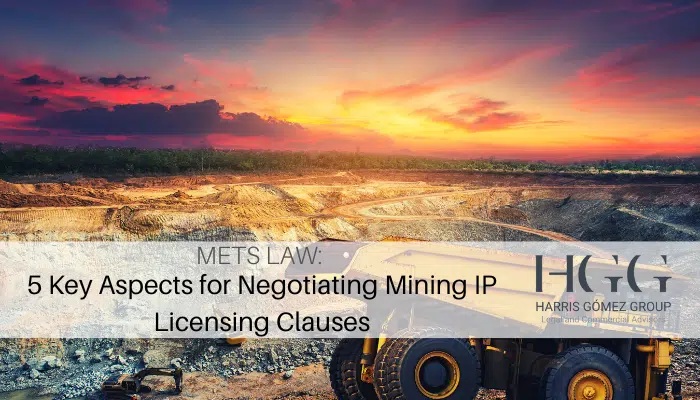Written by Luke Musto, Associate
Introduction
Mining Intellectual Property (IP) licensing contracts play a critical role in the mining industry, allowing companies to access and utilise valuable technologies and proprietary information. However, negotiating these contracts requires careful consideration to ensure the rights and obligations of both parties are adequately protected. We have seen first-hand the devastating impact that a poorly negotiated IP license clause can have on a company’s operations. In this post, we will explore five key aspects that require special attention during the negotiation of mining IP licensing clauses in contracts.
-
Clearly Defined Scope of the License
Clearly defining the scope of the license is the foundation of any mining IP licensing agreement. It outlines the specific rights granted to the licensee and the limits on their use of the licensed IP. To ensure a successful negotiation, both parties must clearly define the scope of the license. This should address the following points:
- Exclusive or Non-Exclusive: Determine whether the license is exclusive, granting sole rights to the licensee, or non-exclusive, allowing the licensor to grant similar rights to other parties.
- Geographic Limitations: Specify the territories where the license will be valid, ensuring compliance with regional laws and regulations.
- Field of Use: Define the permitted applications or industries for which the IP can be used, preventing unauthorised use in unrelated areas.
2. Royalties and Payment Terms
The financial aspects of a mining IP licensing contract significantly impact its success and profitability. The royalties and payment terms should be structured in a manner that benefits both parties. Key considerations include:
- Royalty Structure: Clearly outline how royalties will be calculated, whether based on a fixed fee, percentage of revenue, or other mutually agreed-upon terms.
- Payment Schedule: Specify the frequency and due dates for royalty payments, ensuring timely compensation for the licensor.
- Auditing Rights: Include provisions allowing the licensor to audit the licensee’s records to verify royalty calculations and ensure compliance.
3. Protection of Confidential Information
Mining IP often involves sensitive and confidential information, such as trade secrets and technical data. To safeguard these assets, robust confidentiality provisions must be included in the contract. Key considerations include:
- Definition of Confidential Information: Clearly define what constitutes confidential information, covering both technical and business-related data.
- Obligations and Exceptions: Establish the obligations of both parties to protect confidential information and outline any exceptions where disclosure may be permitted, such as legal requirements.
- Post-Termination Obligations: Address the handling of confidential information after the contract termination, ensuring continued protection even after the agreement ends.
4. Term and Termination
The duration of the license and the conditions for termination are critical aspects to consider during negotiations. These clauses provide certainty and protection to both parties. Key considerations include:
- Term Length: Determine the length of the license, considering the technology’s expected lifespan and market dynamics.
- Termination Rights: Clearly outline the circumstances under which either party can terminate the agreement, such as breach of contract, bankruptcy, or material change in business circumstances.
- Transition and Wind-down: In case of termination, establish provisions for a smooth transition, ensuring the licensee’s ability to phase out the use of licensed IP.
5. Dispute Resolution Mechanism
Disputes can arise in any business relationship, and including a well-defined dispute resolution mechanism in the contract is essential to avoid costly and time-consuming litigation. Key considerations include:
- Choice of Law: Specify the governing law that will apply to the contract, ensuring consistency and predictability in case of disputes.
- Mediation or Arbitration: Determine whether disputes will be resolved through mediation, arbitration, or other alternative dispute resolution methods.
- Venue and Jurisdiction: Indicate the location and jurisdiction where disputes will be resolved, considering the parties’ locations and relevant legal frameworks.
Conclusion
Negotiating mining IP licensing clauses in contracts requires a thorough understanding of the nuances involved in protecting valuable intellectual property assets. By carefully considering the scope of the license, royalties, confidentiality, term, and dispute resolution mechanisms, both licensors and licensees can enter into agreements that foster innovation, growth, and mutual success within the mining industry. Engaging legal counsel and maintaining open communication throughout the negotiation process is crucial to achieving a fair and balanced agreement that meets the needs of all parties involved. Getting legal assistance from specialised lawyers early in the process can also avoid costly disputes further down the line.







